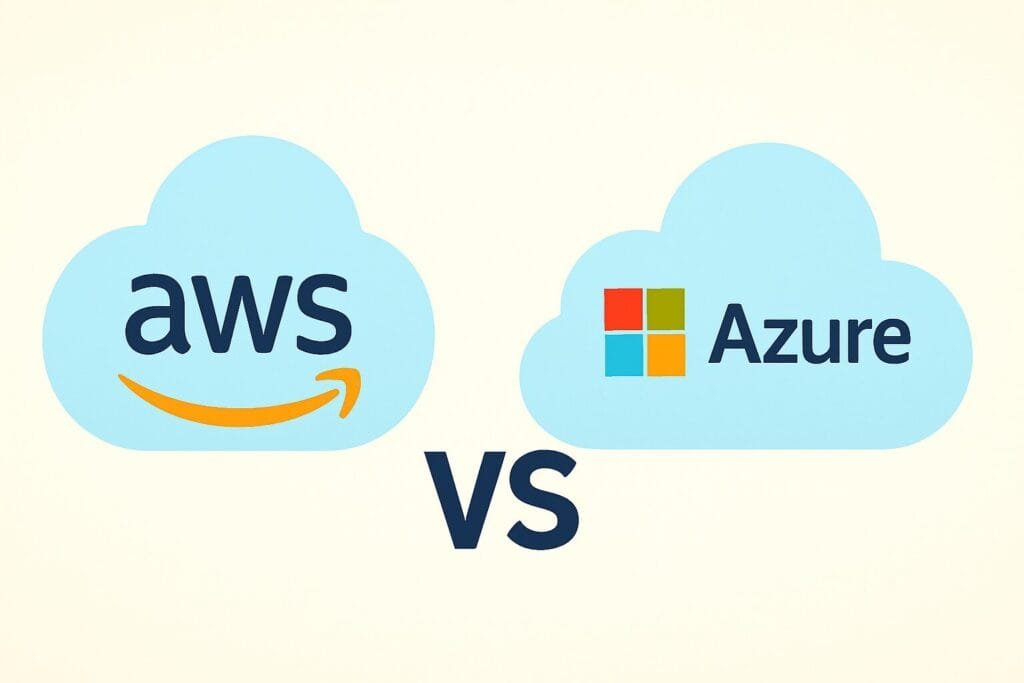In today’s digital era, cloud computing has become the backbone of modern businesses, providing scalability, security, and innovation at unprecedented speed. Two of the biggest names in this field are Amazon Web Services (AWS) and Microsoft Azure. Together, they dominate the global cloud market, constantly competing for leadership. But when it comes to AWS vs Azure, which cloud platform truly leads the industry?

Overview of AWS and Azure
AWS (Amazon Web Services) was launched in 2006 and is widely recognized as the pioneer of cloud services. AWS offers a broad range of solutions, including computing power, storage, machine learning, IoT, and serverless computing. It is known for its reliability and global infrastructure, with data centers spanning across multiple continents.
Azure, introduced by Microsoft in 2010, has quickly caught up to AWS with its integration into the Microsoft ecosystem. It provides enterprise-level cloud solutions, strong hybrid cloud capabilities, and seamless connections with Microsoft products like Windows Server, Active Directory, and Office 365.
Market Share and Growth
According to recent industry reports, AWS still leads the cloud market, holding around 31-33% share, while Azure follows closely with 25-27% share. The competition between these two giants is intense, with Azure showing consistent growth due to Microsoft’s strong enterprise connections and hybrid cloud strategy. You can explore detailed cloud market statistics on Statista.
Key Features Comparison
To understand which platform fits your business needs, let’s compare AWS and Azure across several critical factors.
| Feature | AWS | Azure |
|---|---|---|
| Launch Year | 2006 | 2010 |
| Market Share | ~33% | ~27% |
| Global Reach | 99 availability zones across 31 regions | 60+ regions worldwide |
| Services Offered | 200+ services, including AI, IoT, ML, DevOps | 200+ services, strong enterprise and hybrid support |
| Pricing Model | Pay-as-you-go, reserved instances, spot pricing | Pay-as-you-go, reserved instances, enterprise agreements |
| Strengths | Scalability, global presence, broad ecosystem | Hybrid cloud, Microsoft integration, enterprise adoption |
| Weaknesses | Complex pricing, steep learning curve | Less mature than AWS in some services |
Pricing and Flexibility
Both AWS and Azure use a pay-as-you-go model, but pricing can vary significantly depending on the services you choose. AWS offers a wide variety of pricing options, including on-demand, reserved, and spot instances, but many users find its structure complex. Azure, on the other hand, provides more straightforward pricing for businesses already using Microsoft products and has attractive enterprise agreements.
Performance and Reliability
AWS boasts the largest global infrastructure with numerous availability zones, making it the most reliable option for businesses that require worldwide coverage. Azure, while slightly smaller in global scale, compensates with excellent integration and hybrid solutions, making it a strong choice for enterprises transitioning from on-premises systems to the cloud.
Security and Compliance
Both platforms take security seriously. AWS offers advanced encryption, identity access management (IAM), and compliance certifications across industries. Azure, however, often gains the edge for enterprises due to its deep integration with Microsoft’s security framework, making compliance and identity management seamless for organizations already within the Microsoft ecosystem.
Use Cases: Who Should Choose AWS vs Azure?
- Choose AWS if your priority is global reach, advanced machine learning tools, or running high-scale applications that demand scalability.
- Choose Azure if your organization heavily relies on Microsoft products, requires hybrid cloud solutions, or seeks easier integration with existing IT infrastructure.
Future Outlook
As cloud adoption continues to grow, both AWS and Azure are expected to maintain leadership, but the gap between them is narrowing. Azure is gaining market share faster than AWS, mainly due to its enterprise connections and hybrid cloud focus. AWS, however, remains the first choice for startups, developers, and organizations requiring global scalability.
Conclusion: AWS vs Azure
When comparing AWS vs Azure, it’s clear that both platforms have unique strengths. AWS dominates in terms of global reach and service variety, while Azure stands out in hybrid capabilities and enterprise integration. The choice ultimately depends on your business goals, technical requirements, and budget. Instead of asking which platform dominates, it may be better to ask: Which cloud platform dominates for your business needs?

